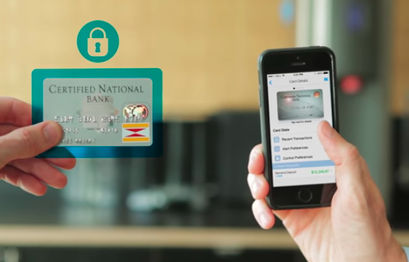One of the most interesting aspects of covering fin-tech is listening to creators describe how they create.
An important part of that discussion is the creator’s background — what in their experience led them to attack that pain point and how their training and particular business background contributed to the solution they developed.
When that past is uncommon, it could produce a unique solution.
[caption id="attachment_26483" align="alignleft" width="155"]
A different background helped Rachna Ahlawat and her team develop Ondot Systems, which develops customized, value-added services for banks and credit unions which allow card users to proactively control their cards and finances.
Ms. Ahlawat and her co-founder started Ondot in 2011. They came from the networking and mobile enterprise space and brought that thinking into the fin-tech space.
“We were excited by the confluence of mobile and finance,” Ms. Ahlawat said.
Ondot developed white-label software which resides in a data center and establishes a communication channel on a mobile phone. As most people carry both bank cards and smartphones, they have the essential tools in place to proactively manage their card activity, Ms. Ahlawat said.
“The cardholder can set their card preferences via their mobile phone, and those preferences are taken into account when the transaction comes in.”
Most people have cards where spending limits and other restrictions are set by banks and their region’s laws. That means the bank’s preferences are taken into account and not yours, she added.
That extends to fraud detection. If the bank’s own algorithms detect fraud, the transaction is blocked, even if it is legitimate, Ms. Ahlawat explained.
Ondot’s philosophy is the cardholder best knows their preferences, so they can switch preferences based on their travel schedule. If your business takes you to Canada and Mexico, you can set your card to accept transactions in those countries during the period of time you will be in Winnipeg and Tijuana. As soon as you leave, you can stop further transactions from those locations.
Cardholders can also set upper limits and restrict their online purchase capability.
The smartphone and card work together, Ms. Ahlawat said. The smartphone can provide such information as location, context and other preferences, while the card is used to complete the transaction.
Should your card be used to complete a transaction above a certain amount or at a store you do not visit, an alert is sent to your phone to approve or deny the transaction. If you take money out of an ATM you can turn off ATM use to protect yourself from card skimming.
“It gives power to user,” Ms. Ahlawat said.
https://www.youtube.com/watch?v=gYNW16BCASM
Ondot’s solutions are perfect for families, Ms. Ahlawat added. If a child is away at university or on a trip, location and amount limits can be set to ensure smart purchase decisions are made.
Just the act of giving the cardholder more control over spending will reduce fraud, Ondot’s own data suggests. Nearly half all fraud is detected by the user, but it takes an average 52 days for such fraud to be detected. Better to stop it before it occurs.
Ondot’s solutions have the potential to rapidly spread because they are working with six of the eight issuer processors in the United States which serve a combined 14,000 banks. They integrate Ondot technology into their systems to provide a hosted solution for banks and credit unions, Ms. Ahlawat said.
Changes can be designed and implemented in as little as 12 weeks.
Banks and partner retailers should embrace the possibilities mobile wallets and their kin provide, Ms. Ahlawat said. Should you make a big a big purchase, you can receive user-based contextual offers for complementary products or e-coupons for future purchases.
“There is a fundamental shift in the financial space where consumers are demanding more,” Ms. Ahlawat said. “Banks should look at which services help them engage with customers and make them want to bank.”
“Reach out to me, not the other way around.”










